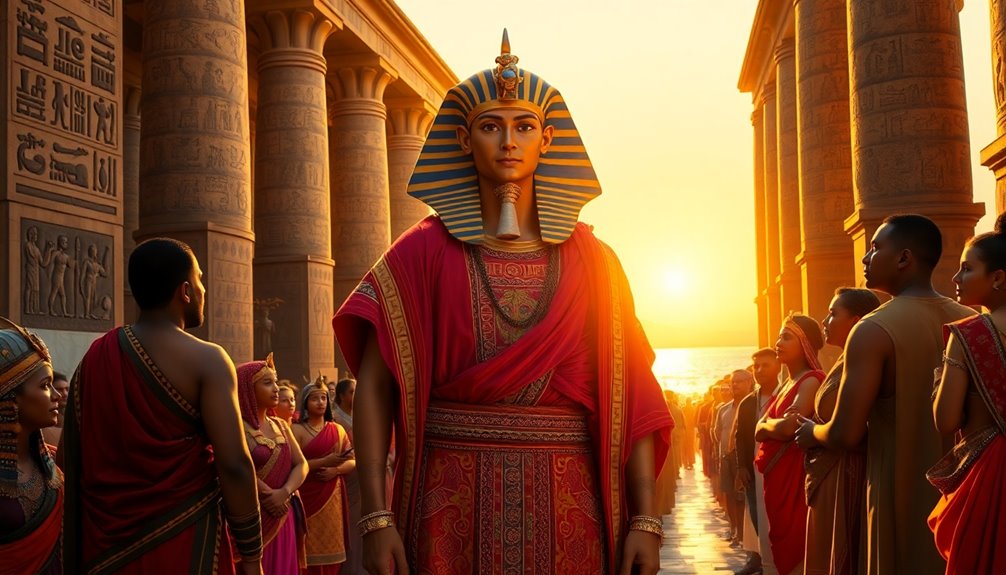Joseph in the Bible presents a powerful story of resilience and divine purpose. As Jacob's favored son, he received a colorful coat, which stirred jealousy among his brothers. They betrayed him, selling him into slavery, but Joseph's unwavering faith and gift of dream interpretation led him to rise as Egypt's Vizier. His dreams prefigured future events, revealing his family's eventual reliance on him during a famine. Through mercy and forgiveness, Joseph reunited with his brothers, showcasing grace amid betrayal. His life teaches profound lessons about resilience, trust, and the transformative power of mercy. You might find more insights into his legacy intriguing.
Key Takeaways
- Joseph, the eleventh son of Jacob and Rachel, was favored by his father and received a richly ornamented coat.
- His prophetic dreams indicated future dominance over his brothers and family, ultimately leading to his rise in Egypt.
- Betrayed by his brothers, Joseph was sold into slavery but maintained integrity and faith through numerous adversities.
- After interpreting Pharaoh's dreams, Joseph rose to power as Vizier, managing Egypt's grain storage during famine.
- Joseph's story emphasizes themes of forgiveness, resilience, and God's sovereignty throughout his life journey.
Introduction

Joseph, the eleventh son of Jacob and Rachel, stands out as one of the most compelling figures in the Bible. His narrative, primarily found in Genesis chapters 37-50, reveals a life filled with trials and triumphs.
You might feel a deep connection to Joseph's story, especially when you consider how he navigated the jealousy of his brothers. Gifted with a richly ornamented coat from the patriarch Jacob, Joseph became the target of envy, which ultimately led to his betrayal and sale into slavery.
Taken to Egypt, Joseph faced significant challenges but also discovered opportunities. His exceptional talent for interpreting dreams not only set him apart but also paved the way for his rise to prominence in Pharaoh's court.
As he managed resources during a severe famine, Joseph's life became a testament to resilience and divine providence. His journey emphasizes the power of forgiveness and reconciliation, especially when he later reunites with his brothers.
Through this compelling narrative, you can see how Joseph's faith and integrity shaped his destiny, making him a foundational figure in Jewish tradition and a symbol of hope for many.
Joseph's Dreams and Their Significance

Joseph's dreams play a crucial role in his life story, offering insight into his future and the challenges he'll face.
By examining primary and secondary Bible references, you can uncover the deeper meanings behind these prophetic visions.
Let's explore how these dreams not only foreshadowed his rise to power but also highlighted themes of divine purpose and jealousy among his brothers.
Primary Bible References
Dreams play a crucial role in the biblical narrative, and in the case of a young man named Joseph, they serve as pivotal symbols of his future and divine purpose.
Joseph, the favored son of Jacob and Rachel, had two significant dreams that foreshadowed his destiny. In the first dream, he saw eleven sheaves of grain bowing to his sheaf, a clear indication of his future dominance over his brothers. The second dream featured the sun, moon, and eleven stars bowing to him, symbolizing the family's eventual submission to him. These revelations ignited jealousy and anger among his brothers, leading them to conspire against him and sell him into slavery.
Later, while in Egypt, Joseph's remarkable ability to interpret dreams became crucial. When Pharaoh experienced troubling dreams about impending famine and abundance, Joseph accurately interpreted them, which elevated him to a position of power.
His dreams, and their interpretations, were early signs of his divinely ordained role in preserving his family's lineage during a time of crisis. This narrative highlights not just Joseph's journey but also the broader theme of dreams as divine communication and guidance in the Bible.
Secondary Bible References
In the unfolding story of Joseph, the significance of his dreams becomes increasingly apparent as events transpire. Joseph's dreams, which depicted eleven sheaves of grain bowing to his sheaf and celestial bodies symbolizing his family, foreshadowed his rise to power over his brothers and parents (Genesis 37:5-11). These dreams not only revealed divine providence and destiny but also ignited jealousy within his brothers, leading to their betrayal and his sale into slavery.
As Joseph journeys to Egypt, his ability to interpret dreams emerges as a pivotal trait. This skill later enables him to interpret Pharaoh's dreams, which are critical to understanding the looming famine and securing his position as the second most powerful man in Egypt (Genesis 41).
The dreams serve as a narrative thread, illustrating how God communicates and guides through visions.
Ultimately, Joseph's dreams encapsulate a significant theme in biblical literature: the intertwining of personal destiny with divine plans. They highlight how seemingly innocuous dreams can lead to transformative events, shaping not just one man's fate, but also preserving his family's lineage during a dire time.
Ancient Egyptian Societal Structure

Ancient Egyptian society was structured like a pyramid, with the pharaoh at the apex as the divine ruler, supported by a class of nobles, priests, and military leaders. Figures like Potiphar, the captain of the guard, held significant power and influence, enforcing the pharaoh's decrees.
Below them, the middle class comprised skilled artisans, merchants, and scribes, essential for the economy and administration of the state. The lower class included farmers and laborers, who toiled the land to sustain the society.
Slavery was a recognized institution in ancient Egypt, often involving prisoners of war or individuals sold into servitude. Joseph's experience as a slave after being sold by his brothers illustrates this harsh reality.
The economy heavily relied on agriculture, with the Nile's annual flooding ensuring fertile land for crops. Grain management was crucial for governance, especially during times of famine, as seen in Joseph's strategic planning.
Religious beliefs intertwined with this societal structure, as the pharaoh was viewed as a living god, responsible for maintaining ma'at, or cosmic order. This divine connection reinforced the hierarchy and influenced daily life across ancient Egyptian society.
Symbolism of Joseph's Dreams

Joseph's dreams serve as a powerful narrative device, revealing not just his future but also the dynamics within his family. His first dream, featuring sheaves of grain, symbolizes his brothers who'll ultimately bow to him during a time of famine. This foreshadowing of authority stirs jealousy and resentment among them, as they grapple with feelings of inferiority and favoritism.
In his second dream, celestial bodies represent his parents and brothers, hinting at a future where they come to him in humility for help. This dream illustrates not only his destined supremacy but also the divine communication he experiences, showcasing his unique connection to God.
Joseph's ability to interpret dreams further emphasizes his role as a vessel for prophetic messages, reinforcing his significance in the unfolding narrative.
The jealousy sparked by Joseph's dreams highlights broader themes of conflict and rivalry, as his brothers struggle with their perceived roles within the family. Ultimately, these dreams aren't just mere fantasies; they serve as a testament to the complex relationships and future events that will shape Joseph's life and the lives of those around him.
Joseph's Role in Egyptian Society

When you examine Joseph's role in Egyptian society, it's essential to consider the historical accuracy of his prison narrative.
Many question how a Hebrew slave could rise to the position of Vizier, raising concerns about the reliability of the story.
Debunking Joseph's Prison Narrative
The story of Joseph in prison often paints a picture of a passive victim, but that narrative overlooks his proactive role in shaping Egyptian society.
After being wrongfully imprisoned due to Potiphar's wife's false accusations, Joseph didn't wallow in despair. Instead, he demonstrated remarkable resilience. While behind bars, he honed his skills in dream interpretation, which quickly earned him a position of authority within the prison.
Joseph managed the prison and helped secure the release from prison for Pharaoh's cupbearer and baker by interpreting their dreams accurately. This pivotal moment not only showcased his talents but also set the stage for his monumental rise.
When Pharaoh faced troubling dreams of famine, it was Joseph's interpretations that led to his appointment as Vizier of Egypt. His strategic planning during years of abundance and famine saved Egypt, proving he was much more than a victim of circumstances.
Historical Accuracy Concerns
How accurate is the portrayal of Joseph as a high-ranking official in ancient Egypt? The Bible depicts Joseph as the Vizier, a role aligned with historical accounts of important administrative positions during the Second Intermediate Period or New Kingdom. This era allowed foreign officials, like Joseph, to gain considerable power.
His management of grain storage during a famine reflects the sophisticated governance systems of ancient Egypt.
Joseph's ability to interpret dreams, particularly those of Pharaoh, highlights a significant aspect of Egyptian culture. Historical texts, including works by Josephus, describe him as a "revealer of secrets," underscoring the cultural value placed on dream interpretation.
His rise from a Hebrew slave to Pharaoh's trusted advisor illustrates the complexities of multicultural interactions in ancient Egypt.
This narrative isn't just a story of personal triumph; it sheds light on the fluidity and political dynamics of the time. Joseph's ascent to power shows how individuals, regardless of their origins, could navigate and influence Egyptian society.
Thus, while some may question the historical accuracy of Joseph's story, it resonates with the broader truths of the era's social structures and cultural practices.
Life Lessons From Joseph's Experiences

Joseph's journey teaches you about resilience in adversity and the importance of maintaining faith during tough times.
When faced with challenges, he showed that perseverance can lead to growth and purpose.
His experiences remind you that even in the darkest moments, there's a bigger plan at work.
Resilience in Adversity
Throughout his turbulent journey, Joseph exemplifies resilience in adversity, demonstrating that hardships can be transformative rather than merely destructive. Despite being sold into slavery by his brothers and later wrongfully imprisoned for rejecting Potiphar's wife's advances, he never lost his integrity. You can learn from Joseph's steadfast faith and positive attitude, which earned him the title "Joseph the Righteous." His moral character shone brightly during his darkest days, reminding you that integrity is vital when facing challenges.
While in prison, Joseph didn't wallow in despair. Instead, he utilized his skill of dream interpretation, which not only provided him hope but also paved the way for his eventual rise to power in Egypt. This highlights how perseverance can turn challenges into opportunities.
Moreover, his act of forgiveness towards his brothers, after years of separation, showcases the transformative power of mercy. By overcoming resentment, he found personal liberation and peace.
Joseph's story underscores that resilience in adversity can shape your destiny, as it did for him, ultimately preserving the lineage of Israel during a time of famine. Embrace your challenges; they might lead you to your greatest achievements.
Faith During Trials
Faith serves as a powerful anchor during life's trials, and Joseph's experiences illustrate this truth vividly. When you face your own challenges, remember Joseph, who maintained unwavering faith despite being sold into slavery and wrongfully imprisoned. His trust in God's divine purpose provided him strength in adversity.
Even when betrayed by his brothers and falsely accused by Potiphar's wife, Joseph chose to uphold his integrity. Instead of seeking revenge, he embraced forgiveness, demonstrating how moral character can lead you through dark times. His ability to interpret dreams not only showcased his gifts but also highlighted that divine wisdom can guide you through difficult circumstances.
While imprisoned, Joseph didn't wallow in despair; instead, he served others by interpreting the dreams of fellow prisoners. This act of maintaining a servant's heart during trials opened doors for unexpected opportunities.
Ultimately, Joseph's journey from slavery to becoming the Vizier of Egypt serves as a powerful reminder. God's sovereignty can transform suffering into success, encouraging you to remain faithful through your own struggles. Trust that your trials have a purpose, and stay aligned with your integrity and faith.
Forgiveness and Familial Reconciliation

The story of Joseph in the Bible serves as a powerful illustration of forgiveness and familial reconciliation. After enduring betrayal by his brothers, who sold him into slavery, Joseph's journey reveals the profound impact of mercy and grace. When he finally reveals his identity, he reassures his brothers, saying, "You meant it for evil, but God meant it for good." This moment encapsulates the redemptive nature of their actions, showcasing how even betrayal can lead to fulfilling God's plan.
The emotional reunion between Joseph and his brothers is a testament to the transformative power of forgiveness. As he embraces them and weeps, it's clear that familial bonds can be restored, even after deep wounds.
Joseph's invitation to his entire family to come to Egypt during the famine is a significant act of reconciliation, reflecting his desire to support them despite past grievances.
Ultimately, Jacob's family prospers in Egypt, reinforcing the importance of forgiveness and reconciliation in Joseph's narrative. His story teaches us that forgiveness can heal relationships and lead to a stronger, united family, emphasizing the enduring power of love and grace.
Additional Resources

To further explore the impactful story of Joseph, there are numerous resources available that can deepen your understanding of his life and the themes of forgiveness and reconciliation.
Start by reading Genesis chapters 37-50, where you'll find the full account of Joseph's journey from favored son to a powerful leader in Egypt. His ability to interpret dreams is a pivotal part of his narrative, especially when he predicts seven years of abundance followed by seven years of famine, which ultimately sets the stage for his rise to power.
Consider delving into biblical commentaries or study guides that analyze Joseph's relationship with Potiphar and the challenges he faced, including false accusations from Potiphar's wife. These resources can provide you with insights into the complexities of his character and the role of his brothers in his life.
Additionally, books that focus on themes of forgiveness and reconciliation can help you appreciate how Joseph forgives his brothers for their betrayal, offering a profound example of grace.
Engage with films or documentaries about Joseph to visualize his story, enriching your appreciation for the lessons it imparts.
Frequently Asked Questions
What Is the Story of Joseph in the Bible?
You encounter a story of a young man whose life takes unexpected turns.
After facing jealousy from his family, he's sold into slavery, yet he rises to a position of power in a foreign land.
Despite betrayal and false accusations, he remains resilient, interpreting dreams that change his fate.
Ultimately, he saves many from famine, leading to a poignant reunion with his family, showcasing forgiveness and the power of destiny in his journey.
Why Is Joseph so Important in the Bible?
You might wonder why a certain figure holds such significance in a historical narrative.
This individual embodies resilience, rising from adversity to a position of power. His ability to interpret dreams not only saves a nation from disaster but also showcases the impact of wisdom and foresight.
Moreover, his story teaches you about forgiveness and reconciliation, highlighting how personal trials can lead to greater purposes and ultimately shape the course of a community's destiny.
What Did Joseph Wait 22 Years For?
You might wonder what someone could wait 22 years for.
Imagine enduring hardships and trials, all while hoping for a reunion with loved ones. You'd face challenges, grow stronger, and rise to unexpected heights.
During that time, you'd yearn for reconciliation and a chance to see if those who wronged you have changed.
This lengthy wait reveals the power of patience, forgiveness, and the possibility of a brighter future after enduring significant struggles.
What Was the Character of Joseph in the Bible?
When you think about a character like Joseph, you see integrity and resilience.
He shows you the power of maintaining faith, even when faced with adversity. You notice his refusal to seek revenge, instead choosing forgiveness.
His wisdom shines through his ability to interpret dreams, guiding him to success. You admire his strong moral compass and commitment to divine purpose, reminding you that hardships can lead to greater outcomes.










